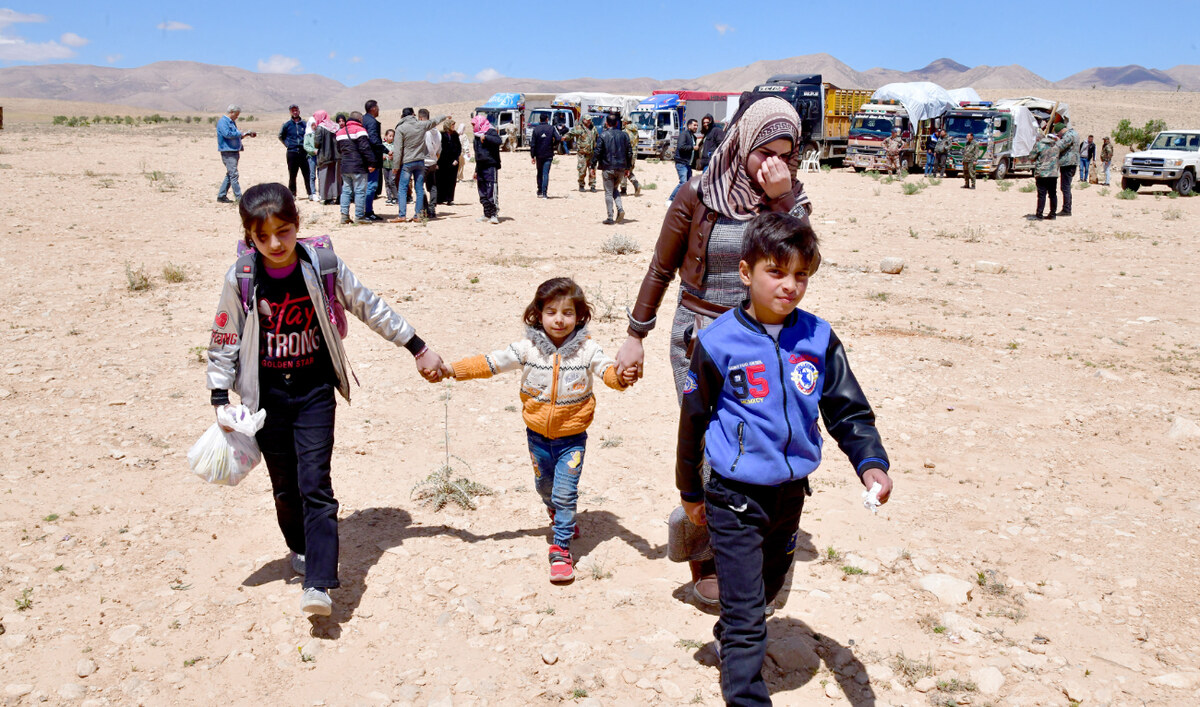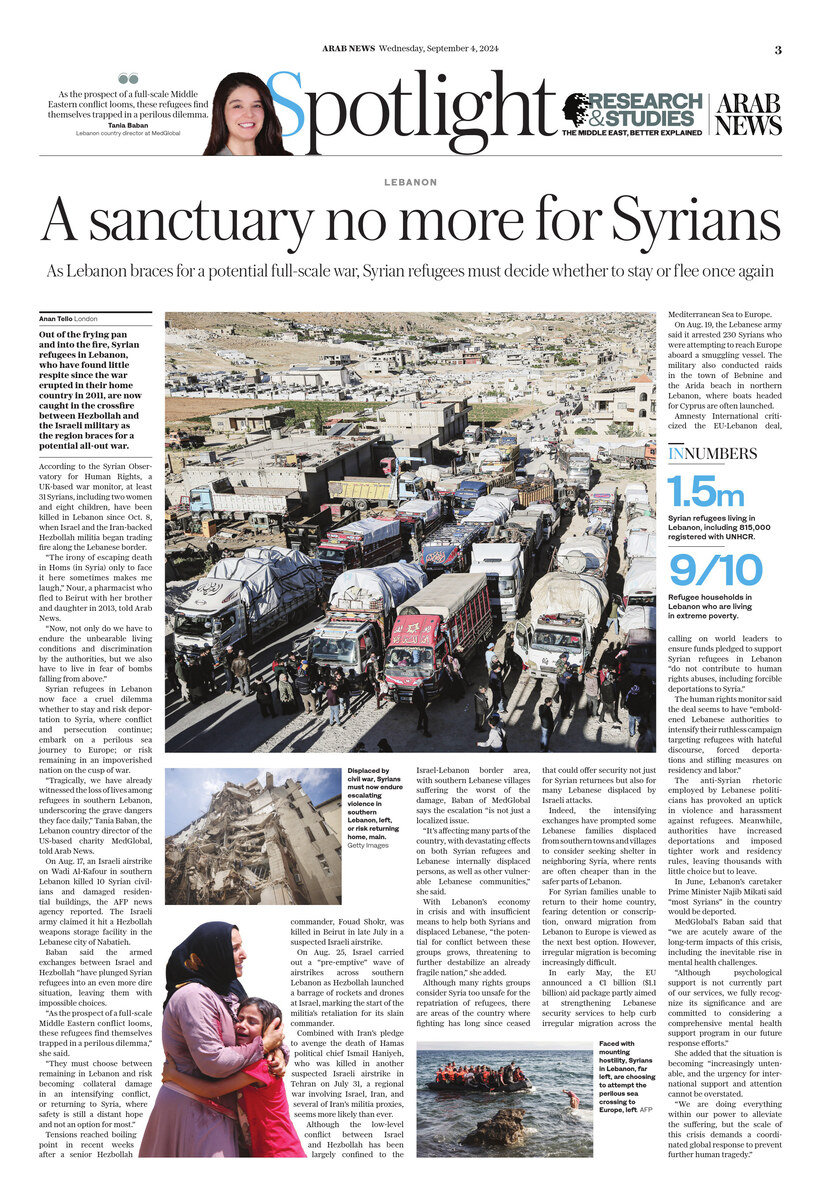LONDON: Out of the frying pan and into the fire, Syrian refugees in Lebanon, who have found little respite since the war erupted in their home country in 2011, are now caught in the crossfire between Hezbollah and the Israeli military as the region braces for a potential all-out war.
According to the Syrian Observatory for Human Rights, a UK-based war monitor, at least 31 Syrians, including two women and eight children, have been killed in Lebanon since Oct. 8, when Israel and the Iran-backed Hezbollah militia began trading fire along the Lebanese border.

Damaged buildings following an Israeli strike in the Dahiyeh suburb in Beirut on August 9, 2024. (Getty Images)
“The irony of escaping death in Homs (in Syria) only to face it here sometimes makes me laugh,” Nour, a pharmacist who fled to Beirut with her brother and daughter in 2013, told Arab News.
“Now, not only do we have to endure the unbearable living conditions and discrimination by the authorities, but we also have to live in fear of bombs falling from above.”
Syrian refugees in Lebanon now face a cruel dilemma whether to stay and risk deportation to Syria, where conflict and persecution continue, embarking on a perilous sea journey to Europe, or risk remaining in an impoverished nation on the cusp of war.
“Tragically, we have already witnessed the loss of lives among refugees in southern Lebanon, underscoring the grave dangers they face daily,” Tania Baban, the Lebanon country director of the US-based charity MedGlobal, told Arab News.

Syrian refugees working near Lebanon’s border with Israel wait to be evacuated to a safe location, on October 13, 2023. (AFP)
On Aug. 17, an Israeli airstrike on Wadi Al-Kafour in southern Lebanon killed 10 Syrian civilians and damaged residential buildings, the AFP news agency reported. The Israeli army claimed it hit a Hezbollah weapons storage facility in the Lebanese city of Nabatieh.
Baban said the armed exchanges between Israel and Hezbollah “have plunged Syrian refugees into an even more dire situation, leaving them with impossible choices.
“As the prospect of a full-scale Middle Eastern conflict looms, these refugees find themselves trapped in a perilous dilemma,” she said.
“They must choose between remaining in Lebanon and risk becoming collateral damage in an intensifying conflict, or returning to Syria, where safety is still a distant hope and not an option for most.”

Children sit by as a woman washes dishes in a plastic basin outside a tent at a makeshift camp for Syrian refugees in Talhayat in the Akkar district in north Lebanon on October 26, 2022. (AFP)
Tensions reached boiling point in recent weeks after a senior Hezbollah commander, Fouad Shokr, was killed in Beirut in late July in a suspected Israeli airstrike.
On Aug. 25, Israel carried out a “pre-emptive” wave of airstrikes across southern Lebanon as Hezbollah launched a barrage of rockets and drones at Israel, marking the start of the militia’s retaliation for its slain commander.
Combined with Iran’s pledge to avenge the death of Hamas political chief Ismail Haniyeh, who was killed in another suspected Israeli airstrike in Tehran on July 31, a regional war involving Israel, Iran, and several of Iran’s militia proxies, seems more likely than ever.

A Syrian refugee woman living with others in makeshift tents in south Lebanon, hugs her child after an Israeli air strike targeted the outskirt of town of Burj Al-Muluk , some 18kms from the town of Nabatiyeh on July 20, 2024. (AFP)
Although the low-level conflict between Israel and Hezbollah has been largely confined to the Israel-Lebanon border area, with southern Lebanese villages suffering the worst of the damage, Baban of MedGlobal says the escalation “is not just a localized issue.
“It’s affecting many parts of the country, with devastating effects on both Syrian refugees and Lebanese internally displaced persons, as well as other vulnerable Lebanese communities,” she said.
IN NUMBERS
- 1.5m Syrian refugees living in Lebanon, including 815,000 registered with UNHCR.
- 9/10 Refugee households in Lebanon who are living in extreme poverty.
With Lebanon’s economy in crisis and with insufficient means to help both Syrians and displaced Lebanese, “the potential for conflict between these groups grows, threatening to further destabilize an already fragile nation,” she added.
As Lebanon braces for the possibility of all-out war, MedGlobal is collaborating with the Lebanese Ministry of Health to establish a command and control center to coordinate and streamline response efforts across the country.
“This center is vital in ensuring that resources are allocated efficiently and that the most urgent medical needs are met with precision and speed,” she said.

MedGlobal’s efforts are currently concentrated in the West Bekaa region, “where we are providing critical medical care through a primary health care center.
“This facility is a lifeline, delivering essential health services to Syrian refugees, vulnerable Lebanese communities, and, most recently, families displaced from the southern border.”
Although many rights groups consider Syria too unsafe for the repatriation of refugees, there are areas of the country where fighting has long since ceased that could offer security not just for Syrian returnees but also for many Lebanese displaced by Israeli attacks.
Indeed, the intensifying exchanges have prompted some Lebanese families displaced from southern towns and villages to consider seeking shelter in neighboring Syria, where rents are often cheaper than in the safer parts of Lebanon.

Syrian refugees returning from Lebanon to their country through the Al-Zamrani crossing on May 14, 2024. (AFP)
For Syrian families unable to return to their home country, fearing detention or conscription, onward migration from Lebanon to Europe is viewed as the next best option. However, irregular migration is becoming increasingly difficult.
In early May, the EU announced a €1 billion ($1.1 billion) aid package partly aimed at strengthening Lebanese security services to help curb irregular migration across the Mediterranean Sea to Europe.
On Aug. 19, the Lebanese army said it arrested 230 Syrians who were attempting to reach Europe aboard a smuggling vessel. The military also conducted raids in the town of Bebnine and the Arida beach in northern Lebanon, where boats headed for Cyprus are often launched.

Greek fishermen rescue Syrian Kurdish refugees as the boat they had boarded sinks off the Greek island of Lesbos after crossing the Aegean sea from Turkiye on October 30, 2015. (AFP)
Amnesty International criticized the EU-Lebanon deal, calling on world leaders to ensure funds pledged to support Syrian refugees in Lebanon “do not contribute to human rights abuses, including forcible deportations to Syria.”
The human rights monitor said the deal seems to have “emboldened Lebanese authorities to intensify their ruthless campaign targeting refugees with hateful discourse, forced deportations and stifling measures on residency and labor.”
The anti-Syrian rhetoric employed by Lebanese politicians has provoked an uptick in violence and harassment against refugees. Meanwhile, authorities have increased deportations and imposed tighter work and residency rules, leaving thousands with little choice but to leave.

A girl speaks with another as he carries a young boy while walking past tents at a makeshift camp for Syrian refugees in Talhayat in the Akkar district in north Lebanon on October 26, 2022. (AFP)
In June, Lebanon’s caretaker Prime Minister Najib Mikati said “most Syrians” in the country would be deported, claiming that his government was “in the process of putting in place a solution” to the refugee issue.
After issuing eviction orders in June, Lebanese security forces conducted door-to-door checks in the northern villages of Btourram and Hasroun to confirm that Syrians living there without legal documentation had vacated their residences.
On Aug. 28, the Lebanese National News Agency also reported that security forces had evicted Syrians from their homes in the village of Rashkida in the northern Batroun district.
As a result, dozens of Syrian families have been left homeless, forcing them to seek refuge either with relatives in other parts of Lebanon or in makeshift camps, with serious implications for their health and well-being.

A Syrian refugee walks with her children at a refugee camp set up outside the Lebanese village of Miniara, in the northern Akkar region near the border with Syria, on May 20, 2024. (AFP)
MedGlobal’s Baban said that “while our immediate focus is on addressing these critical healthcare needs, we are acutely aware of the long-term impacts of this crisis, including the inevitable rise in mental health challenges.
“Although psychological support is not currently part of our services, we fully recognize its significance and are committed to considering a comprehensive mental health support program in our future response efforts.”
She added that the situation is becoming “increasingly untenable, and the urgency for international support and attention cannot be overstated.
“We are doing everything within our power to alleviate the suffering, but the scale of this crisis demands a coordinated global response to prevent further human tragedy.”



























